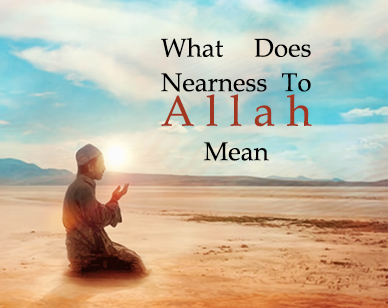Our familiarity with the derived and colloquial meanings that we use in social
life often results in error and mistake. It happens that words which are used in
Islamic sciences have abandoned their real meaning, and have found a derived and
commonly used meaning.
Now, when we use the word `nearness' outside of its colloquial meaning, we
intend it in its real meaning: that is, we may say: `there is a spring near that
hill', or `I myself went near that hill'. Here we are using `near' in its real
sense. That is to say that we really do conceive of distance and nearness as the
intermediate space as far as the hill, and we use the word `nearness' to
indicate that that distance which is a real fact, not just something we have
agreed upon - has been reduced.
But when we say that so-and-so is close or near to someone of eminence in
society, or we say that so-and-so, because of some service he rendered, became
close to this or that person of social standing, what do we mean? Is the meaning
that the distance between the two has decreased; for example, before he was
within five hundred meters and now he is within a hundred meters? Of course not;
if it were so, than a servant in someone's house would automatically be more
favored than anyone else in nearness to him.
Our meaning is rather that the servant, as a result of his service, influences
his master's state of mind, and thus the latter becomes pleased with him when
before he was not pleased, or he becomes more pleased, and in the end, because
of this, the master bestows more favor on him than before.
So the use of nearness here is a figurative use, not a literal one; in reality,
the external existence of one person is not fixed in nearness to the external
existence of another. Rather, because of the special psychological relationship
which exists between the master and the servant and its effects, which in this
particular relationship derive from the psychological situation, the term
`nearness' is defined figuratively and by comparison.
What, then, is `nearness' to the being of al -Haqq? Is it literal nearness or
figurative nearness? Are the slaves of Allah, through submission, worship,
conduct and purity moving up towards Allah, and thus becoming nearer to Him? Is
the distance between them becoming shorter; to that point at which distance
vanishes, and, in the Qur'anic expression, "meeting with the Lord"
(liqa'u'r-rabb) takes place?
Or, if all these expressions are figurative expressions, then what is
`approaching near to' Allah? Of course, Allah has no nearness or distance.
Nearness to Allah is exactly like closeness to someone of social eminence; that
is to say, Allah acquires satisfaction from His slave, and, in the end, His
grace and favor is returned and it increases.
Of course, another question then arises, and that is: what is Allah's
satisfaction? Allah is not a locus of events such that He could be dissatisfied
with someone, and later become satisfied, or be satisfied with someone and then
become dissatisfied. Inevitably the answer comes that the expressions
`satisfaction' and 'dissatisfaction' are also figurative expressions, the object
of works for Divine mercy and favor which come in the form of obedience and
devotion and nothing else.
So what is this mercy and favor? Here there are different reasoning’s. Some
divide mercies and favors generally into spiritual and material. Spiritual
blessings, for example, wisdom and the joy acquired through it, and material
blessings1, for example, the Garden of Paradise, the maidens and
palaces (of Paradise).
Others, even though they acknowledge spiritual mercies, also reject them, and
confine the favors and positions of men in nearness to Allah to the Garden, the
physical paradises, the maidens and palaces, apples and pears." The result of
the argument of the latter group is that the meaning of `the friends (wali) of
Allah' becoming closer to the Being of Oneness is that he has the right to more
maidens, palaces, apples, pears, garden and orchard than another person.
The meaning of what the deniers of true nearness say is that, the result of
devotion and worship is not that there is a difference in the relation of Allah
to His slave (as the supporters of real nearness also acknowledge in this
matter), and not that there is a difference in the relation of the slave to
Allah. From the point of view of nearness and distance the foremost individuals
of the human world, the Prophet, and the most wretched of them, such as Pharaoh
or Abu Jahl2 are equal.
The truth of the matter is that this confusion originates from a kind of
materialistic thinking about Allah and man, especially about man. Someone who
only knows man as a heap of water and clay, and does not wish to acknowledge the
fundamental;
﴾So when I have made him complete and breathed into him of My spirit,
(15:29)﴿
And does not even want to consign a figurative meaning to this expression, has
no remedy against the denial of real nearness to al-Haqq.
But what need is there for us to suppose that man is so lowly and mundane that
we are forced to give everything an allegorical explanation and justification?
Allah is pure perfection and infiniteness, and from the point of view of reality
existence is the same as perfection, and every true perfection returns back to
the reality of existence which is true reality, as with knowledge, power, life,
will, mercy, goodness, and more.
Existents, in the source of their creation, in every respect in which they share
in a more perfect existence, that is to say, a more powerful and stronger
existence with the Divine Essence which is absolute existence and pure
transcendence, are nearer; naturally the angels are nearer to Allah than
inanimate things and plants, and similarly some angels are more in advance than
others. Some have control over and are obeyed by others: and remoteness is
connected with the source of creation, and, as they say, is connected with the
arc of descent. 3
Existents, especially man, according to Quran:
﴾Surely we are Allah's and to Him we shall surely return (2:156)﴿
Return to Allah. Man, according to the degree of his existence, must make that
return in the form of obedience and in acts of free-will and the accomplishment
of his duty, and what does Nearness to Allah Mean?
Form of choice and liberty. Man truly passes through stages and degrees of
nearness to his Lord by travelling the way of obedience to his Lord; in other
words he journeys from the station of animalist to the station above the angels.
This ascension and rising is not a matter of formality and routine, it is not an
arrangement or a construct of our minds, it is not a kind of promotion from
simply belonging to some ministry to being a minister, or from simply being a
party member to being a party leader, rather it is an ascendance of the ladder
of existence, which is the same thing as the increasing and completion of
knowledge, power, life, purpose, will, extending the bounds of penetration and
possession. "Nearness to Allah" means really passing through the degrees and
stations of being and becoming nearer to the infinite center of being.
Therefore, it is impossible for man, as a result of devotion, servitude, and
travelling the path of submission not to reach the station of the angel, not to
go higher than the angel, or at least not to share to the same extent as the
angel in the attainments of being. In order to make clear the station of man,
the Qur'an has said:
﴾And when We said to the angels: Make obeisance to Adam they did
obeisance, but Iblis (did it not). He refused. (2:34)﴿
Truly, it must be said, the repudiator of the station of man, whoever he may be
is Iblis.
* Book: Wilayah, the Station of the Master. By: Ayatullah Murtadha Mutahhari
1. Apples and
pears, as such, are not referred to in the Qur'an, but we are told that there
are fruits in Paradise. (tr.)
2. The greatest of the Prophet's enemies in Mecca.
3. Refer to Taf sir al-mizan, footnote to ayah 124, surah 2: "And when his Lord
tested Ibrahim with certain words, and he fulfilled them. He said, `Behold, I
make you an Imam for the people' " which proves this matter in a most elegant
way.




















